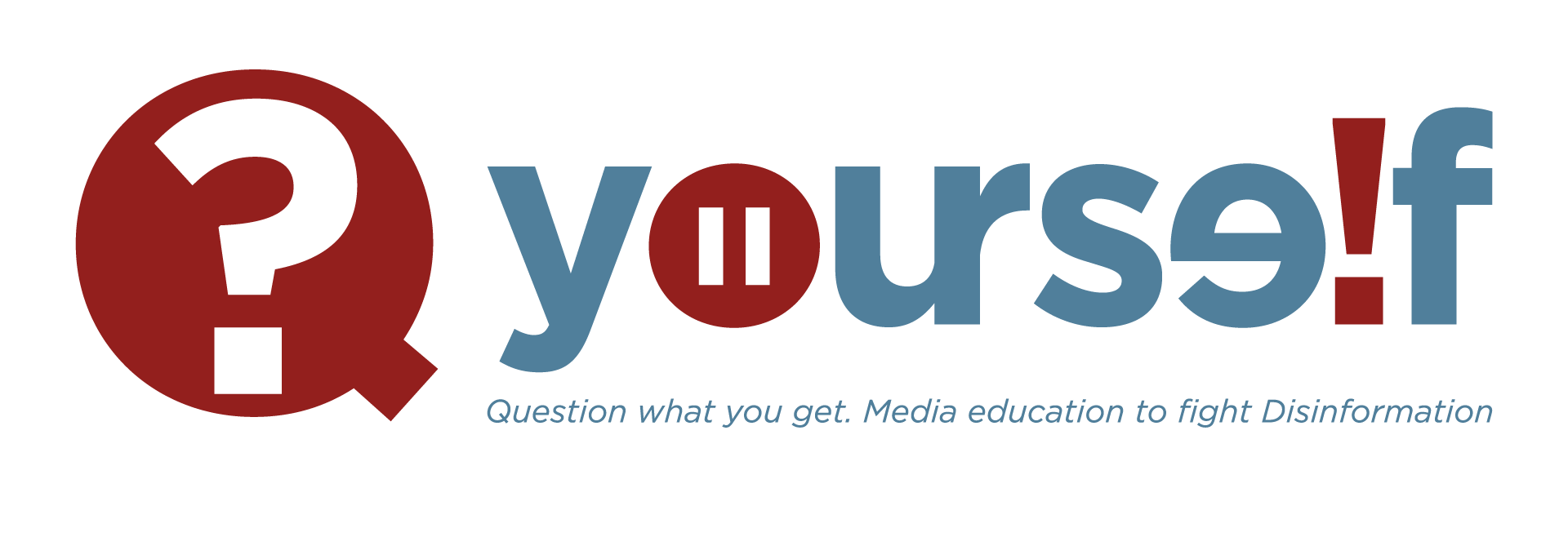Results
Be an advocate to fight disinformation!
In this section, you can access all the materials created and adopted in the QYourself project
Toolkit for Educators
Trainers’ didactic Manual, Tools & Trainings for Educators with upskilling opportunities in digital media literacy, produced by the collective effort of the Partnership
Encourage critical thinking among your learners with basic journalistic skills
Project Research Materials
Think Like a Journalist
Document with the synthesis of the University Degree in Journalism.
Field Research (Students and Teachers)
Project Results – The Partership conducted a preliminary Field research involving teachers and students to assess the current situation and needs regarding Disinformation and Media Literacy.
Glossary
The Partnerhsip produced the Project Glossary, which is crucial to understand the correct meaning of the terms we utilize daily.
Visualization of Partners needs and general information
This document resumes the specific challenges and specific needs for each organization involved in the partnership.
Roundtable takeaways
The Roundtables provide a very important contribution from Media experts involved in the partnership.
Roundtable results from the Partnership
The Roundtables provide a very important contribution from the partnership.
Headlines experts - MIL
These are the most important quotes from the Media and Information Literacy experts.
The Manual
This document is envisioned to be the main deliverable of the project, containing a research on Disinformation, how to address the matter and propose solutions.
Open Courses
focus on:
- strategies for the identification of text and source veracity
- foster critical thinking
- improve trainers’ digital skills
- improve competencies related to changes in behaviours and attitudes of the learners related to information sources
The 10 Open Educational Resources (OERs)
International upskilling session in Spain
Teachers’ upskilling program on strategies to include media literacy tools in regular teaching situations in different teaching contexts including 4 adult educations scenarios and 1 high-school situation:
The Journalistic Method
A methodology to combat the diffusion of Disinformation by the University of the Basque Country.
Digital Upskilling
This digital upskilling, developed for educators, will teach how to select, use and create digital content, using tools such as Canva, Genially and Moodle.
The QYOURSELF Handbook
International Teacher Training on Strategies to verify Sources and Texts.
OER 1
Learn how to identify and check sources of information
OER 2
Elements of information
OER 3
Basic journalistic application to the analysis of an apparently informative message
OER 4
Information_vs_Opinion
OER 5
Practical exercises – example Libelos de sangre_Mocejón
International online upskilling on how to create digital materials
Digital Course to upskill educators on selection, use and creation of digital content using different free tools and platforms
Template For Learning Scenario
Presentation UPV/EHU
Iberika presentation on Canva
How to fight disinformation
The European Framework
European institutions consider Disinformation as one of the major threats to social cohesion.
Discover the European efforts to fight disinformation.
Fact-checking compass
How to spot information manipulation – European Parliament.
DigComp Framework
Digital competencies Framework – European Commission.
Communication & Journalism - Theory
A fundamental paradigm in the study of communication that describes the communicative act through five key elements: who says, what is said, through which channel, to whom, and with what effect.
How to tackle misinformation
How to tackle misinformation – European Commission
Unesco Report Fake News
UNESCO report on Journalism, Fake News, Disinformation – 2023
Guidance on strengthening
Guidance on Strengthening the Code of Practice on Disinformation 2021 – European Commission.
